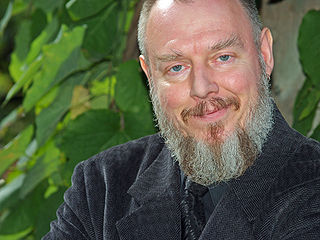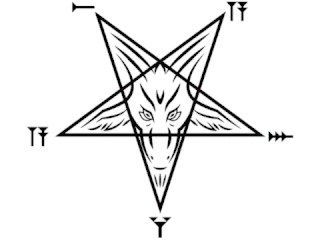
Satan, also known as the Devil, and sometimes also called Lucifer in Christianity, is an entity in Abrahamic religions that seduces humans into sin or falsehood. In Judaism, Satan is seen as an agent subservient to God, typically regarded as a metaphor for the yetzer hara, or "evil inclination". In Christianity and Islam, he is usually seen as a fallen angel or jinn who has rebelled against God, who nevertheless allows him temporary power over the fallen world and a host of demons. In the Quran, Shaitan, also known as Iblis, is an entity made of fire who was cast out of Heaven because he refused to bow before the newly created Adam and incites humans to sin by infecting their minds with waswās.

Satanism refers to a group of religious, ideological and/or philosophical beliefs based on Satan – particularly the worship or veneration of him. Satan is a figure of the devil in Christian belief, a fallen angel and leader of the devils who tempts humans into sin. For many centuries the term was used by various Christian groups as an accusation against ideological opponents. Actually self-identified Satanism is recent, and is thought to have begun with the founding of the Church of Satan by Anton LaVey in the United States in 1966 – that "church" being an atheistic group that does not believe in a literal Satan. Sharing "historical connections and family resemblances" with Satanism, and sometimes overlapping with it, are paganism, ceremonial magic, and "other dark entities such as Set, Lilith, Hecate, and Chaos", from the occult and the 'Left Hand Path milieu.'

Sir Ahmed Salman Rushdie is an Indian-born British-American novelist. His work often combines magic realism with historical fiction and primarily deals with connections, disruptions, and migrations between Eastern and Western civilizations, typically set on the Indian subcontinent. Rushdie's second novel, Midnight's Children (1981), won the Booker Prize in 1981 and was deemed to be "the best novel of all winners" on two occasions, marking the 25th and the 40th anniversary of the prize.

The Church of Satan (CoS) is a religious organization dedicated to the religion of Satanism as defined by Anton Szandor LaVey. Founded in San Francisco in 1966, by LaVey, it is considered the "oldest satanic religion in continual existence", and more importantly the most influential, inspiring "numerous imitator and breakaway groups". According to the Church, Satanism has been "codified" as "a religion and philosophy" by LaVey and his church.

Anton Szandor LaVey was an American author, musician, and Satanist. He was the founder of the Church of Satan and the religion of Satanism. He authored several books, including The Satanic Bible, The Satanic Rituals, The Satanic Witch, The Devil's Notebook, and Satan Speaks! In addition, he released three albums, including The Satanic Mass, Satan Takes a Holiday, and Strange Music. He played a minor on-screen role and served as technical advisor for the 1975 film The Devil's Rain and served as host and narrator for Nick Bougas' 1989 mondo film Death Scenes.

A Black Mass is a ceremony celebrated by various Satanic groups. It has allegedly existed for centuries in different forms, and the modern form is intentionally a sacrilegious and blasphemous parody of a Catholic Mass.

The Satanic Bible is a collection of essays, observations, and rituals published by Anton LaVey in 1969. It is the central religious text of LaVeyan Satanism, and is considered the foundation of its philosophy and dogma. It has been described as the most important document to influence contemporary Satanism. Though The Satanic Bible is not considered to be sacred scripture in the way that the Christian Bible is to Christianity, LaVeyan Satanists regard it as an authoritative text as it is a contemporary text that has attained for them scriptural status. It extols the virtues of exploring one's own nature and instincts. Believers have been described as "atheistic Satanists" because they believe that God and Satan are not external entities, but rather projections of an individual's own personality—benevolent and stabilizing forces in their life. There have been thirty printings of The Satanic Bible, selling over a million copies.

The Satanic Verses is the fourth novel of British-Indian writer Salman Rushdie. First published in September 1988, the book was inspired by the life of the Islamic prophet Muhammad. As with his previous books, Rushdie used magical realism and relied on contemporary events and people to create his characters. The title refers to the Satanic Verses, a group of Quranic verses about three pagan Meccan goddesses: Allāt, Al-Uzza, and Manāt. The part of the story that deals with the satanic verses was based on accounts from the historians al-Waqidi and al-Tabari.
LaVeyan Satanism is the name given to the form of Satanism promoted by American occultist and author Anton LaVey (1930-1997). LaVey founded the Church of Satan (CoS) in 1966 in San Francisco. Although LaVey is thought to have had more impact with his Satanic aesthetics of "colourful" rituals and "scandalous" clothes that created a "gigantic media circus", he also promoted his ideas in writings, such as the popular Satanic Bible. LaVeyan Satanism has been classified as a new religious movement and a form of Western esotericism by scholars of religion. LaVey's ideas have been said to weave together an array of sometimes "contradictory" "thinkers and tropes", combining "humanism, hedonism, aspects of pop psychology and the human potential movement", along with "a lot of showmanship", His ideas were heavily influenced by the ideas and writings of Friedrich Nietzsche, Ayn Rand and Arthur Desmond.

Peter Howard Gilmore is an American writer and LaVeyan Satanist. He is the current High Priest of the Church of Satan. As a representative of the Church of Satan, Gilmore has been interviewed on numerous television and radio programs dealing with the topic of Satanism, including appearances on History, the BBC, Syfy, Point of Inquiry, and Bob Larson's Christian radio show.
Satan is an embodiment of antagonism, often synonymous with the Devil.

Theistic Satanism, otherwise referred to as religious Satanism, spiritual Satanism, or traditional Satanism, is an umbrella term for religious groups that consider Satan, the Devil, to objectively exist as a deity, supernatural entity, or spiritual being worthy of worship or reverence, whom individuals may contact and convene with, in contrast to the atheistic archetype, metaphor, or symbol found in LaVeyan Satanism. Organizations who uphold theistic Satanist beliefs most often have few adherents, are loosely affiliated or constitute themselves as independent groups and cabals, which have largely self-marginalized. Another prominent characteristic of theistic Satanism is the use of various types of magic. Most theistic Satanist groups exist in relatively new models and ideologies, many of which are independent of the Abrahamic religions.
Satanism is a belief or social phenomenon that features the veneration or admiration of Satan or a similar figure.

The Satanic Verses controversy, also known as the Rushdie Affair, was a controversy sparked by the 1988 publication of Salman Rushdie's novel The Satanic Verses. It centered on the novel's references to the Satanic Verses, and came to include a larger debate about censorship and religious violence. It included numerous killings, attempted killings, and bombings by perpetrators who supported Islam.
Greater and lesser magic, within LaVeyan Satanism, designate types of beliefs with the term greater magic applying to ritual practice meant as psychodramatic catharsis to focus one's emotions for a specific purpose and lesser magic applied to the practice of manipulation by means of applied psychology and glamour to bend an individual or situation to one's will.
Hail Satan, sometimes Latinized as Ave Satanas or Ave Satana, is an exclamation used by some Satanists to invoke the name of Satan in contexts ranging from sincere expression to comedy or satire. The Satanic Temple uses the phrase as a sincere expression of rational inquiry removed from supernaturalism and archaic tradition-based superstitions.
The Satanic panic is a moral panic about alleged widespread Satanic ritual abuse which originated around the 1980s in the United States, peaking in the early 1990s, before waning as a result of scepticism of academics and law enforcement agencies who ultimately debunked the claims. The phenomenon spread from the United States to other countries, including South Africa, where it is still evident periodically. South Africa was particularly associated with the Satanic panic because of the creation of the Occult Related Crimes Unit in 1992, described as the "world's only 'ritual murder' task force". According to anthropologist Annika Teppo, this was linked with powerful conservative Christian forces within the then-dominant white community in the last years of apartheid. Christian belief is a prerequisite to serve in the unit. The concern with the alleged presence of Satanism and occult practices has continued into the post-apartheid era.
A Satanist is an adherent of Satanism.

Joy of Satan Ministries, also referred to as Joy of Satan (JoS), is a website and western esoteric occult organization founded in 2002 by Andrea M. Dietrich (a.k.a. Maxine Dietrich). Joy of Satan Ministries advocates "Spiritual Satanism", an ideology that presents a synthesis of Theistic Satanism, Nazism, Gnosticism, Paganism, Western esotericism, UFO conspiracy theories and extraterrestrial beliefs similar to those popularized by Zecharia Sitchin and David Icke.









